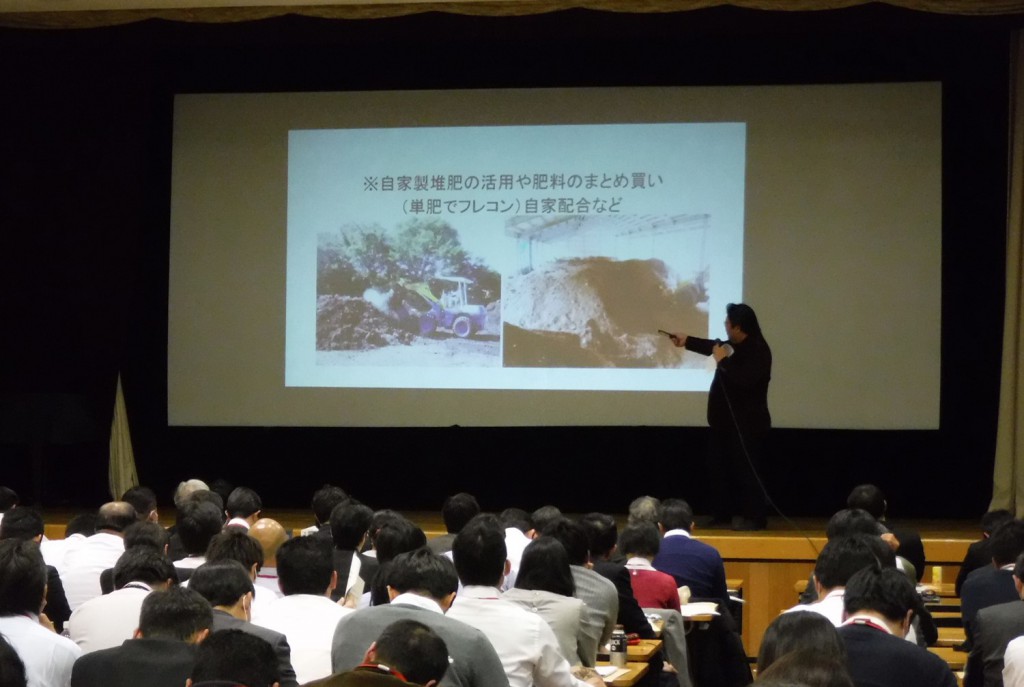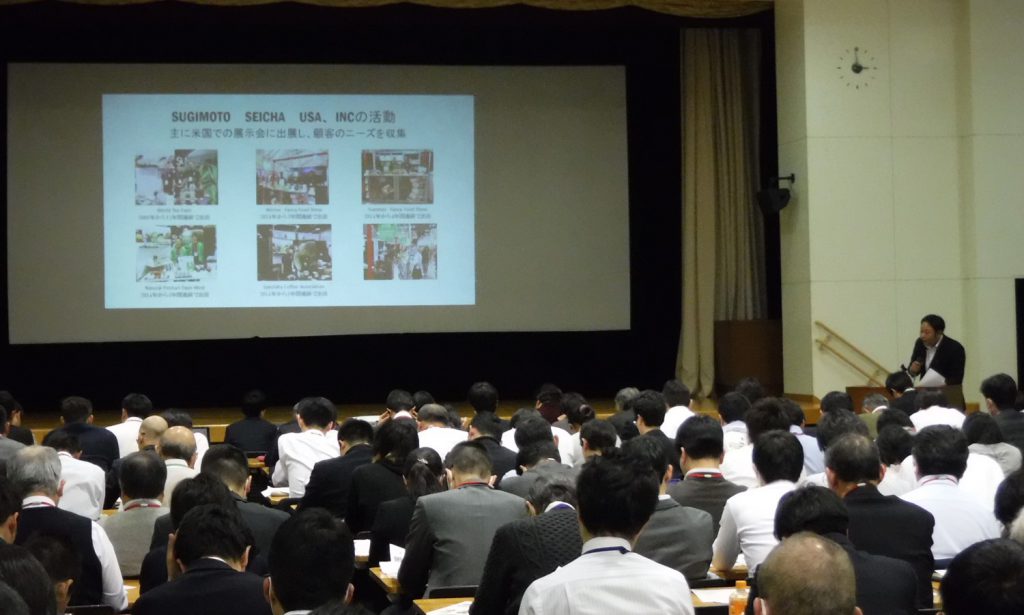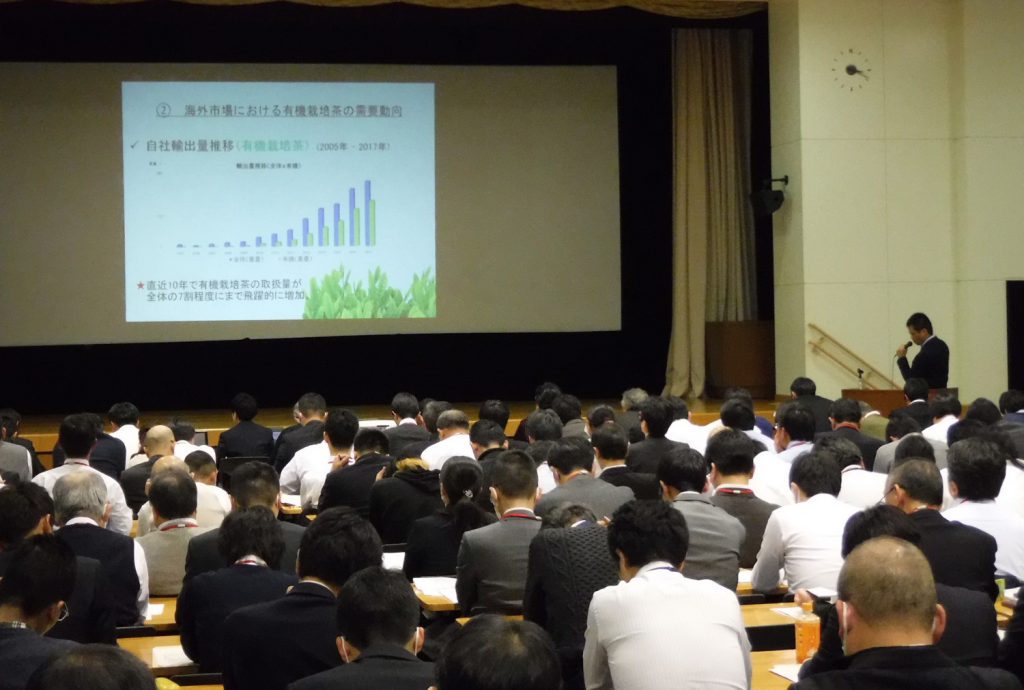Ministry of Agriculture, Forestry and Fisheries held “Organic Tea Power Up Meeting” on 26th January for enhancing the growth of domestic organic tea farming. Two farmers of organic tea took presentations about their practices to manage tea plantations in organic manner and two tea companies told the growing demand for organic tea worldwide.
Mr. Nishi, president and CEO of Nishi Tea Factory Co., Ltd.
Mr. Nishi explained the practices carried out by Nishi Tea Factory. He put importance on two points. One is hand weeding and second is nutrition for tea plants.
Nishi Tea Factory employs approx. 200 persons for hand weeding to remove weeds in their tea plantations without any chemicals. Although the labor cost becomes high, he consider the cost as an important necessary expense.
Nishi told that they use the manure compost made by themselves.

He considers the essential management of soil nutrients is supply of proteins onto soil. He studied a lot about plant nutrition and soil fertilities. Since the ratio of nitrogen uptake by tea plants is approx. 40%, the company supply a sufficient amount of their own-made compost onto each tea plantations based on the chemical analysis of soil and compost. He considers maintaining the higher content of protein in soil by supply of organic matter like compost is the most important for the management of tea plants’ nutrition. His mind is consistent with the scientific evidences.
Application of organic matter is known to increase the content of nitrogen in bio-available form, resulting in higher yield and quality of tea[004]. As a form of bio-available nitrogen, “protein-like nitrogen” has been considered to be significant. Matsumoto et al.(2000) reported the content of organic nitrogen extracted by phosphate buffer correlate strongly with the mineralizable nitrogen content and implied the mineralizable nitrogen could be protein-like nitrogen, which has a distinct molecular weight about 8,000 – 9,000 Da[491]. Miura (2011) reviewed the application of organic matter, such as manure compost, can increase the content of protein-like nitrogen.
These researches indicate maintaining higher level of protein-like nitrogen by organic fertilizer could be effective for adequate growth of tea plant, which is very consistent with Nishi’s mind.
Mr. Orita, president of Orita en Co., Ltd.
Mr. Orita also emphasized the importance of self-making organic fertilizer and nutrition management based on the analysis of soil. He put the importance on balance of minerals. Now he intends much better evidence-based management of tea plantation by cooperation with his son, who has profession in pharmacy.
Besides, he also use large labor cost on weeding and thinks the cost as necessary expense.
Presentations by the Big Two Organic Tea Farmers led me realize the significance of weeding and soil management in organic tea farming again.
Sugimoto Seicha Co., Ltd. and Maruyama Tea Products Cooperation emphasized the worldwide gaining demand for organic tea.
Sugimoto Seicha Co.,
Sugimoto Seicha Co., Ltd.has increased the supply of organic Japanese tea to the market of USA according to the gaining demand. Indeed, the tendency is reported in some posts such as World Tea News. Sugimoto Seicha co. ltd. has been developing the partnership with highly-motivated tea farmers. Since 2014, the company has cooperated with a prominent organic tea farmer in Fujieda tea estate in Shizuoka. And Sugimoto Seicha made a contract with the tea farmer for purchase of organic tea for 10 years to strengthen the production of organic tea products.

Maruyama Tea Products Cooperation
Maruyama Tea Products Cooperation explained the gaining demand of Japanese tea, especially organic tea, in Europe. As consumers get to demand more safe products, more organic products get to be required. According to the needs of consumers, the company has also developed its domestic supply-chain of organic tea.
Based on the Japanese website of the company, Maruyama Tea Products Cooperation makes contracts with some tea production groups, which are certificated as “eco-farmers” by the president of Shizuoka prefecture.

I hope these excellent practices of tea farmers and merchants could be widely spread in Japan. For the goal, the technology for organic tea farming should be more developed and the related research activities should be more accelerated!
